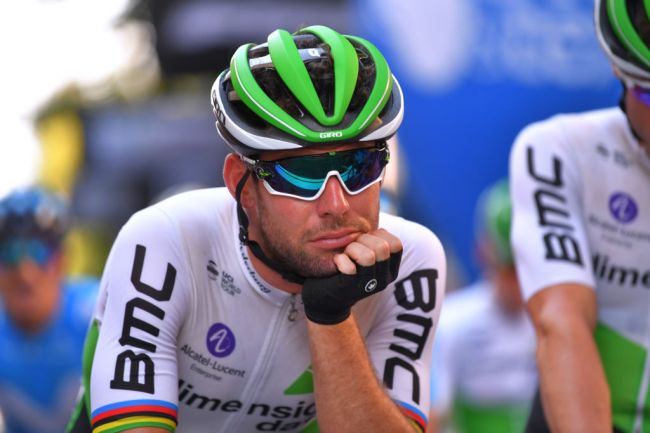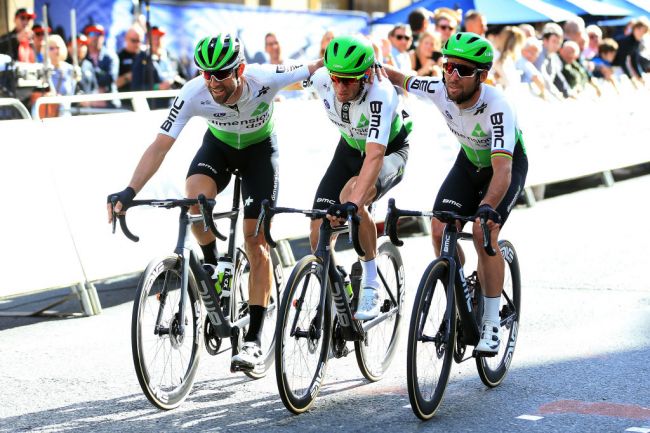Philippa York analysis: Mark Cavendish still has a lot to offer
'You get hard times, but I still love it' says former world champion

You would think that Mark Cavendish would be frustrated. For someone with his palmarès, who has won so many races, he could well be a bundle of nerves. I'm half expecting a worried, grumpy sod of a bike rider, crushed by the pressure to perform, tired of being in the spotlight, but, after stage 6 of the Tour of Britain – a 14km time trial – the Dimension Data sprinter's warming down with a smile as bright as the afternoon sunshine.
Could McLaren sponsorship at Bahrain-Merida edge Mark Cavendish towards team?
Mark Cavendish not selected for Tour de France
Mark Cavendish clears Epstein-Barr threshold for first time in two years
Renshaw hangs up his wheels at Tour of Britain
Philippa York analysis: Cummings shows he still has what it takes at Tour of Britain
Maybe it's the visit of wife Peta and 16-month-old Casper that sees him so cheery, but, as with everything in life, that would be too simple an explanation. And Mark Cavendish is anything but simple.
That's not to say he's too complicated, either, which is an opinion I've read in the past. You don't become the greatest sprinter in Tour de France history by being complicated, difficult or a pain to work with. You reach the top level by taking what talent you have and maximising every part of that and fitting into a team structure. Basically, if they don't like you, then you'll last five minutes and be another statistic.
Cavendish has been a pro for a long, long time compared to the average racing career, so obviously he's had something very special to offer. But like all sporting careers, there's the up part and then the gradual tapering off to a well-earned retirement.
As you go down the slope, there are fewer temporary friends, fewer people telling you how great you are, and a lot less adulation. It can be difficult for some riders to deal with the situation when all they hear is, "You're past it," and everyone asks when you're going to stop because you aren't cutting it anymore.
Sadly, it's all too easy to assume that Cavendish has stopped caring as much as he used to when he hasn't appeared on the top step of the podium for so long, and that the desire to win and be competitive has left him. If he couldn't be bothered, then the case for the condemnation of the Manxman would be established, but he still does care.

He can still analyse all those itsy-bitsy little details that are essential to have, and there's a serious streak running through him that's apparently a holdover from his British Cycling Academy days. The self-criticism installed then has been a vital part of remaining at the forefront of road sprinting. But there's always someone who comes along to take your place or who, as in the case of Colombian sprinter Fernando Gaviria, just has a ridiculous amount of talent.
Get The Leadout Newsletter
The latest race content, interviews, features, reviews and expert buying guides, direct to your inbox!
That's Mark's assessment of Gaviria and not mine, and he'd know. One of the privileges of the elite is that you recognise your rivals' strengths and weaknesses as much as you do your own.
'I know why I'm not winning and I know I'm going to win again'
You need a number of elements to be the number one in anything, so health, mental toughness, intelligence and talent are all intertwined, and when one of those parts goes wrong, like it did with the now-retired Marcel Kittel, people can be quick to make judgements.
We who watch from the outside need to remember that riders are people, too. They aren't robots, and the ones like the Dimension Data sprinter tend to have figured stuff out as well, as he points out.
"I know the reasons why I'm not performing and I know I can perform. If I didn't know why I'm not winning, I'd have stopped now. I know why I'm not winning and I know I'm going to win again, and that's why I'm still riding," Cavendish says.
"Otherwise, I'd have been better off stopping and not damaging my legacy. Once I got my head around the fact that basically I've had two years off, then I've just been riding, building my fitness. I'm working my way through that so I'm quite relaxed. I'm just looking at the future.
"It's always nice to be at the Tour of Britain," he continues. "I tried to give it a shot yesterday [stage 5], but, honestly, I'm quite relaxed. It's not the be-all and end-all. I know there'll be people to criticise, but it's all right, though. You get hard times, but I still love it.
"Fundamentally, I love cycling. There's stuff around it I don't like that isn't in my control, like the pressure [to perform], but I still love it. It's not even the pressure; it's more when people say stuff that isn't true facts. People prefer to say negative stuff when they could champion the sport and say positive stuff. It's quite a beautiful sport; it's quite special."
The end
Mark Renshaw appears, time trial done and dusted, so I ask Cavendish if he'll miss him, as the Australian's been a big part of the British sprinter's lead-out train for many of his teams, and the Tour of Britain was to be his last race.
"I guess so… Like, all three of us – Bernie [Eisel], me, Mark – are at this race, so it's quite fitting. It's not an end of an era, but it's quite strange," Cavendish says. "It's probably easier now because there are so many options. I'm nervous of losing the structure when I stop."

That moves the conversation onto the quirks of rooming with others.
"I always have the bed closest to the bathroom, and it doesn't matter which way round the room is, and Bernie has the bed next to the window. He snores, so when he does, I kick or hit his bed and he stops, but last night we couldn't push the beds apart so he was really close.
"Then two nights ago he started snoring and I went to thump his bed but had forgotten he was so close and I whacked him. A proper whack, it was. Then, in the morning, he asked if I'd punched him and I said, 'Yeah.'
"It's nuts, though, because guys like footballers don't room-share, but I don't like being on my own," Cavendish says. "I go up the wall if I'm alone."
I could understand all that, as I always tried to choose the bed that meant I didn't have to look at my fellow traveller when I woke up, and I also disliked being on my own after the day's racing was over.
People thought I was grumpy and almost anti-social, too, but then I didn't really want to talk about the bike race for more than half an hour after it was over. So, to be fair, I probably was grumpy, but on discussing hotel room tactics and losing stuff, we agree that being tidy has its merits.
With Cavendish's Dimension Data teammate Steve Cummings crashing out of the race the day before, I thought I'd maybe ask about dealing with that side of racing, but Mark had already noticed I'd done the interview and jinxed his teammate. He was right, though: each time I've interviewed Steve, he's pulled out of the race for some reason or another.
Superstitious? Probably not. Observant? Well, here's something he has noticed that I hadn't really thought about.
"You're getting near the end when you know more race directors and support staff than you do bike riders," Cavendish says.
Conversely, all those young bike riders he might not recognise all know who Mark Cavendish is. And the crowds that hang around the team bus at each start and finish show how popular he remains, and justifiably so.
Respect is earned in the cycling world by being special, and when he told me not to ask what's happening next year, I didn't.
Philippa York is a long-standing Cyclingnews contributor, providing expert racing analysis. As one of the early British racers to take the plunge and relocate to France with the famed ACBB club in the 1980's, she was the inspiration for a generation of racing cyclists – and cycling fans – from the UK.
The Glaswegian gained a contract with Peugeot in 1980, making her Tour de France debut in 1983 and taking a solo win in Bagnères-de-Luchon in the Pyrenees, the mountain range which would prove a happy hunting ground throughout her Tour career.
The following year's race would prove to be one of her finest seasons, becoming the first rider from the UK to win the polka dot jersey at the Tour, whilst also becoming Britain's highest-ever placed GC finisher with 4th spot.
She finished runner-up at the Vuelta a España in 1985 and 1986, to Pedro Delgado and Álvaro Pino respectively, and at the Giro d'Italia in 1987. Stage race victories include the Volta a Catalunya (1985), Tour of Britain (1989) and Critérium du Dauphiné Libéré (1990). York retired from professional cycling as reigning British champion following the collapse of Le Groupement in 1995.
